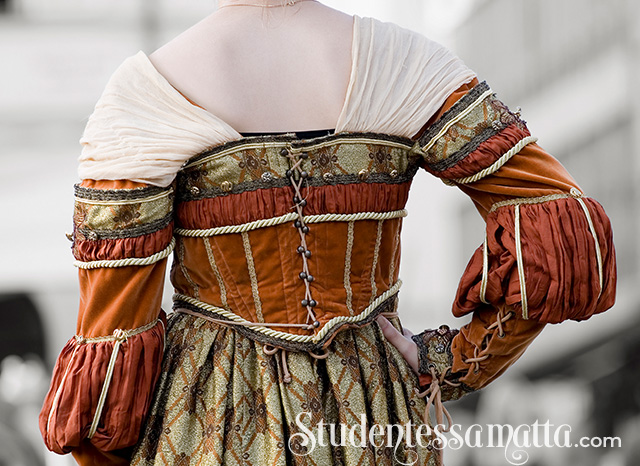
Che vuol dire ‘È tutto un altro paio di maniche’?
Scoprilo con Elena da Bergamo!
“What does ‘È tutto un altro paio di maniche’ mean?
Find out with Elena from Bergamo!”
Che c’entrano le maniche… e perché mai ci serve un altro paio?
What do sleeves have to do with it—and why on earth do we need another pair?
Vi presento la mia amica Elena di Bergamo, un’insegnante di italiano che offre esperienze di immersione linguistica in famiglia per studenti desiderosi di imparare l’italiano, godendo dell’atmosfera calda e autentica della casa di un’insegnante in Italia.
Meet my friend Elena from Bergamo, an Italian teacher who offers immersive homestay experiences for students wanting to learn Italian while enjoying the warm, authentic atmosphere of a teacher’s home in Italy.
Elena è qui per farci luce su questa curiosa espressione che coinvolge le “maniche” e il motivo per cui potremmo aver bisogno di un altro paio!
Elena is here to shed some light on this curious expression involving “sleeves” and why we might need another pair!

Elena explains the expression: “È tutto un altro paio di maniche.”
Ciao a tutti! La scorsa settimana, durante la visita al Castello di Malpaga, ho avuto modo di spiegare l’origine dell’espressione: “È tutto un altro paio di maniche.”
Ciao everyone! Last week, during a visit to Catello di Malpaga, I had the perfect opportunity to explain the origins of the Italian expression “E tutto un altro paio di maniche.” This expression literally translates to: It is all a matter of another pair of sleeves.”

Dalle maniche medievali a un’espressione moderna
From Medieval Sleeves to a Modern Expression
L’espressione “È tutto un altro paio di maniche” è ancora in uso per esprimere l’idea che “è un’altra cosa del tutto” o che c’è stato uno sviluppo inaspettato. In inglese potremmo tradurla con “That’s another kettle of fish” o “That’s a whole new ballgame.”
The expression “È tutto un altro paio di maniche” is still used today to convey the idea of “it’s a whole different thing” or to refer to an unforeseen and surprising development. In English, we’d say, “That’s another kettle of fish” or “That’s a whole new ballgame.”
Tutto, apparentemente! Nel Medioevo, più eleganti erano le maniche del tuo vestito, maggiore era il prestigio sociale che guadagnavi.
During the Middle Ages, the more elegant the sleeves of your dress, the more prestige you garnered in society.
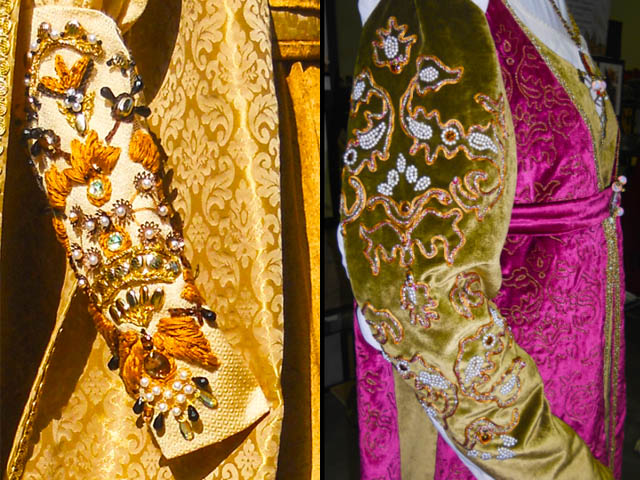
Dalle maniche medievali a un’espressione moderna
From Medieval Sleeves to a Modern Expression
Nel Medioevo, le maniche erano un chiaro indicatore dello status sociale: più erano raffinate, più alto era il rango della persona. Gli abiti delle donne avevano maniche staccabili e intercambiabili, che permettevano di cambiarle in base all’occasione.
In medieval times, sleeves were a clear marker of social status: the more refined they were, the higher the wearer’s standing. Women’s gowns featured detachable, interchangeable sleeves, allowing for customization depending on the occasion
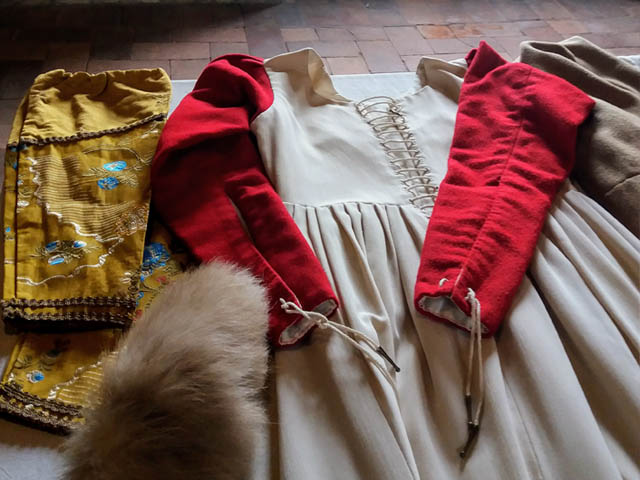
Maniche pratiche e preziose
Sleeves practicle and precious
A casa si indossavano maniche più semplici, mentre per feste e occasioni speciali si sceglievano quelle più elaborate, ricamate o decorate con pietre preziose. Questo sistema era anche un vantaggio pratico: le maniche si sporcavano facilmente, dato che non esistevano deodoranti o antitraspiranti.
At home, women wore modest sleeves, but for parties or special occasions, they opted for more elaborate ones, often embroidered or adorned with precious stones. This was also practical: sleeves got dirty easily, especially without deodorants or antiperspirants.
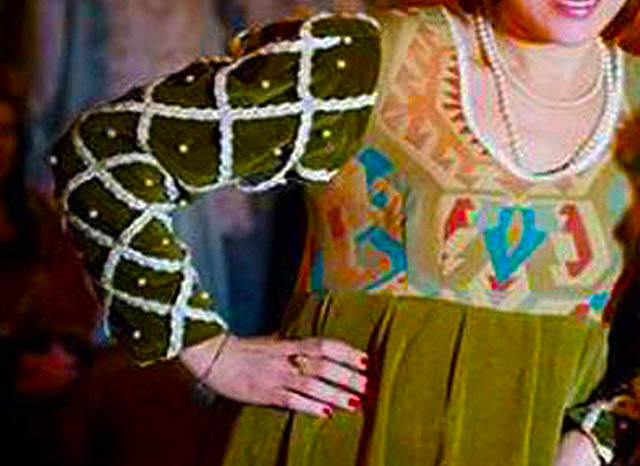
Fare il bucato, un incubo medievale!
Doing laundry was a medieval nightmare!
Fare il bucato nel Medioevo era faticoso e noioso. Non c’era la lavatrice, ma bisognava trascinare il pesante abito lungo fino al fiume e lavarlo battendolo sulle rocce.
Doing laundry in the Middle Ages was exhausting. Forget washing machines—you had to haul your heavy, floor-length, beaded, and embroidered silk dress down to the river and beat it on a rock to get it clean.
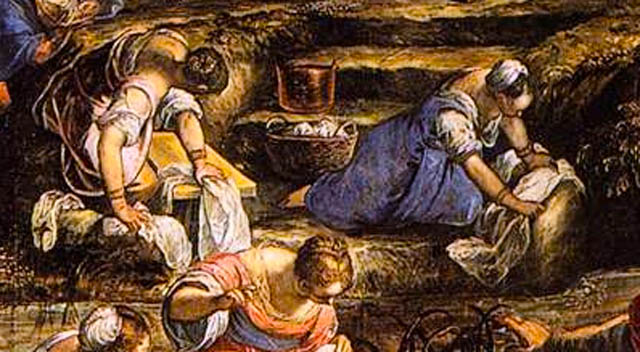
Maniche come un pegno d’amore
Sleeves as a Token of Love
Le maniche staccabili erano così preziose che riceverle poteva essere significativo quanto ricevere un anello di fidanzamento! Riesci a immaginare il tuo amato inginocchiarsi e offrirti, insieme al suo cuore, un nuovo paio di maniche?
Removable sleeves were so valuable they were akin to receiving a wedding ring! Can you imagine your betrothed kneeling and offering you his heart—and a new pair of sleeves?
E ora immagina cosa avresti fatto se avessi annullato il fidanzamento. Oggi restituiremmo l’anello di fidanzamento… e allo stesso modo, all’epoca, un fidanzamento rotto richiedeva di restituire quelle maniche. Un altro motivo per avere un altro paio di maniche! Ognuno ha la sua storia, e questo era solo l’inizio di un racconto completamente nuovo. “È davvero tutto un altro paio di maniche.”
Now imagine what you’d do if you called the engagement off. Today, we’d return the engagement ring… and, back in the day, a broken engagement meant giving those sleeves back. Another case for another pair of sleeves! To each their own, and the start of an entirely new story. “It’s all just another pair of sleeves.”

E alla fine, tutto si riduce a un altro paio di maniche!
In the End, It’s All Just Another Pair of Sleeves!
Che si tratti di un’espressione medievale, di un simbolo d’amore o semplicemente di un modo per dire “è tutta un’altra storia,” le maniche ci insegnano che c’è sempre spazio per nuove possibilità, soluzioni creative, e magari anche un po’ di dramma storico. Quindi, la prossima volta che sentirai qualcuno dire “È tutto un altro paio di maniche”, ricorda: ogni storia ha le sue maniche… e il suo fascino unico!
Whether it’s a medieval tradition, a token of love, or just a way to say “that’s a whole new ballgame,” sleeves remind us there’s always room for new possibilities, creative solutions, and maybe a touch of historical drama. So next time you hear someone say “It’s all just another pair of sleeves,” remember: every story has its sleeves… and its own unique charm!
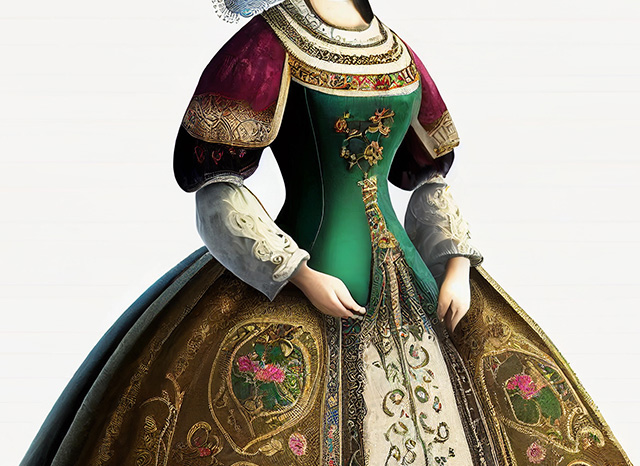
Italian Homestays immerse you in language and family life.
Embrace Italian Life: Your Home Away from Home in Italia!
Imagine learning Italian while immersing yourself in the language on vacation. Better yet, become part of an Italian family for a week, joining in daily activities like cooking, shopping, and enjoying movies in their cozy living room. Homestay vacations offer a glimpse into everyday life in Italy and provide formal instruction from your teacher and hostess. Spend the rest of your time practicing Italian with your host and other family members, forging unforgettable bonds and gaining a true appreciation for Italian life.
Please note that your Italian teacher is generously opening their home to provide accommodations, lessons, meals, and excursions during your stay. It’s not just a budget-friendly option but an investment in your Italian language journey—an invaluable opportunity. Prices vary based on season, duration, lesson hours, and location, typically ranging from $1000 to $3600 for a week.
Make a Reservation / Inquire About Dates & Prices











